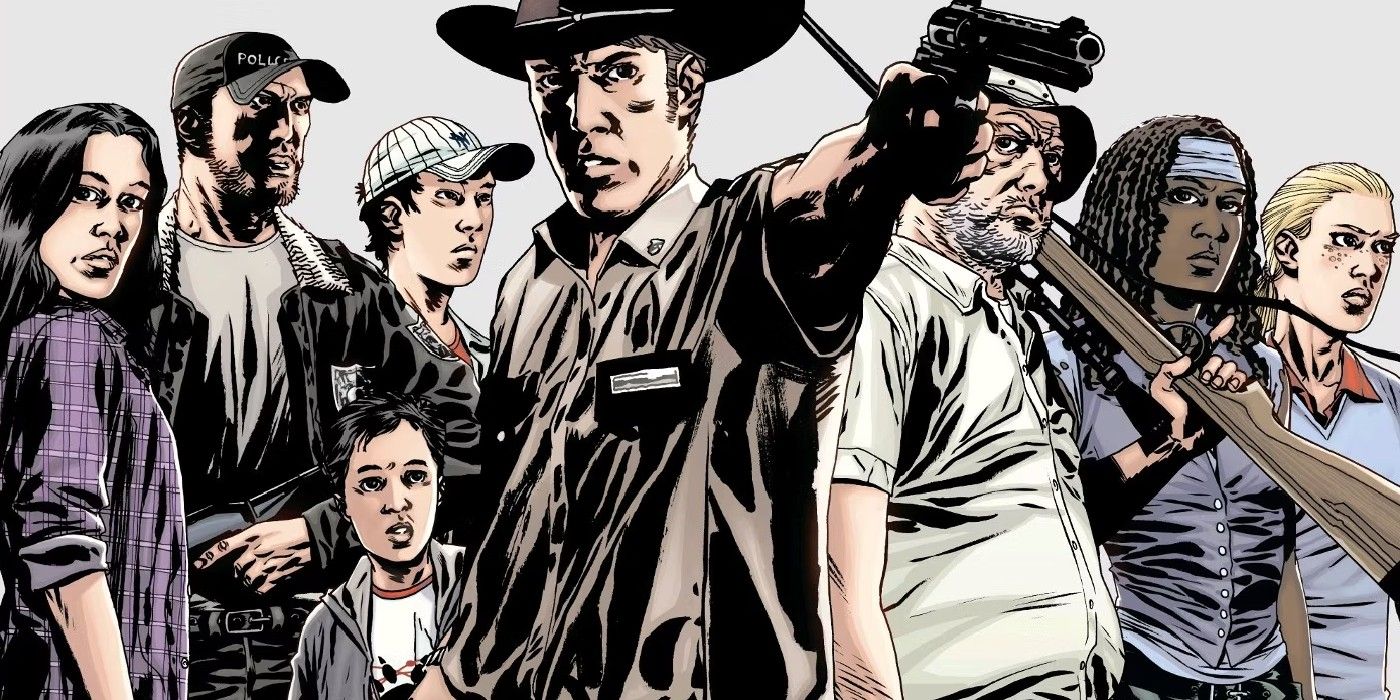
Ask most fans of The Walking Dead what the series is about, and they will say survival – but according to creator Robert Kirkman, halfway through its run, the comic shifted away from its focus on surviving the zombie outbreak, turning its attention to living in the new world the outbreak had created. In fact, it would actually be this ongoing thematic and narrative struggle that ultimately defined the series.
The Walking Dead Deluxe #96 – written by Robert Kirkman, with art by Charlie Adlard – is a reprint of the original 2012 issue, which concluded with an extended speech by central character Rick Grimes. In his notes on the issue, included with the Deluxe edition, Kirkman explained that Rick’s monologue signaled a major change in direction for the series.
Of course, Rick’s declaration that “we can finally stop surviving…and start living,” would be almost immediately complicated by the introduction of Negan, and his murder of Glenn, in The Walking Dead #100.
Rick’s Speech At The End Of “The Walking Dead #96” Signaled A New Direction For The Series
The Walking Dead Deluxe #96 – Written By Robert Kirkman; Art By Charlie Adlard; Color By Dave McCaig; Lettering By Rus Wooten
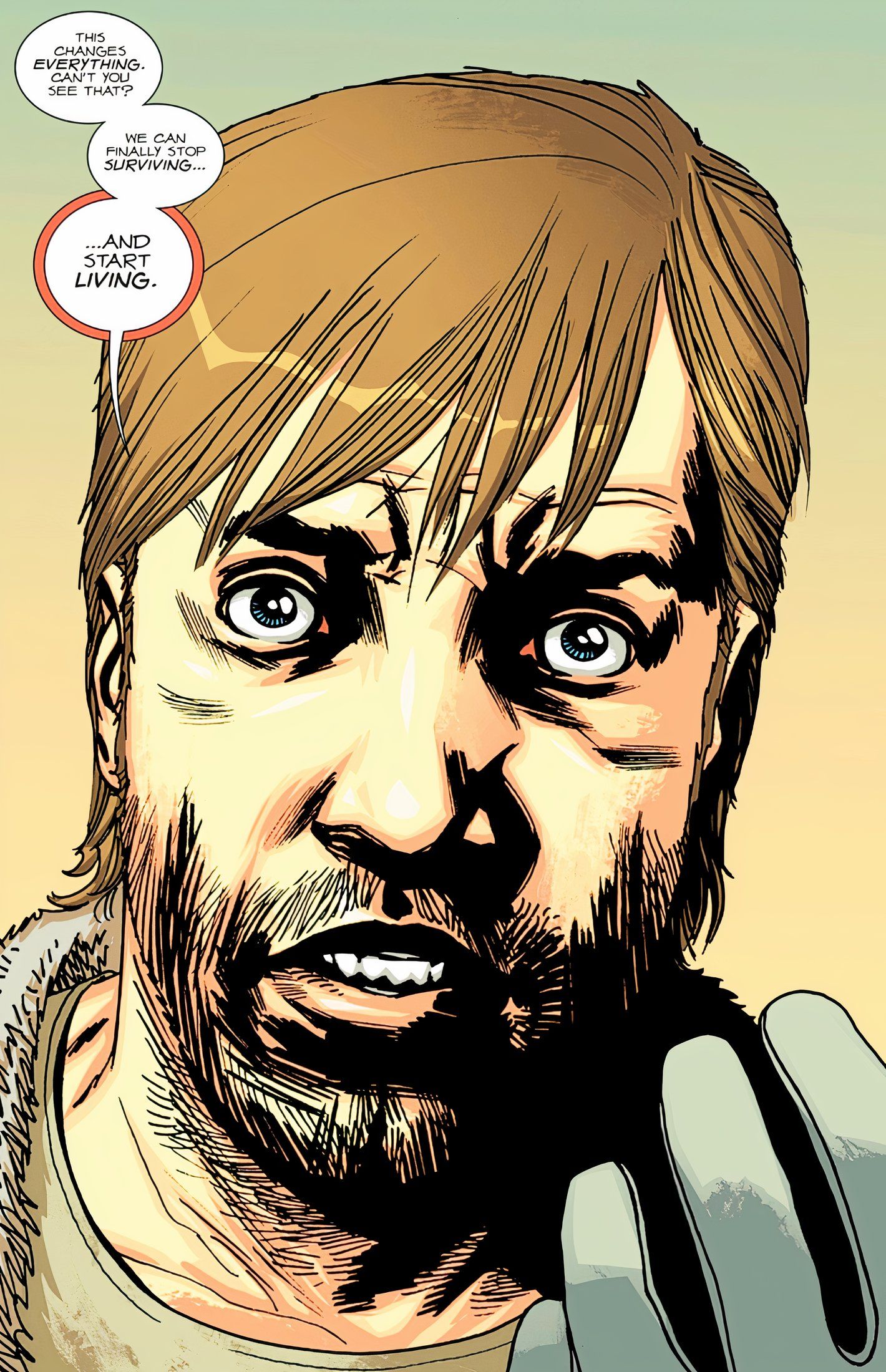
As the author emphasized here, Rick gave direct expression in the world of The Walking Dead to its creator’s intentions for the plot moving forward.
The Walking Dead Deluxe has been an exciting return to the series, and by far the most rewarding thing for fans of the franchise on an issue-by-issue basis has been Robert Kirkman’s notes on his own series. Kirkman has offered valuable writing advice based on experience learning on-the-fly with The Walking Dead; he has also at times been critical of his own creative decisions, which in its own way has given readers a new perspective on the long-running zombie comic. Above all else, however, Kirkman’s retrospective analysis of his series at the thematic level has been invaluable.
In his notes for The Walking Dead Deluxe #96, Kirkman pokes fun at his decision to end another arc with a long monologue, but wrapped up in his sarcasm is an explanation of the narrative purpose that Rick’s speech served. Kirkman wrote:
OOOH, baby. Nothing says the end of a story arc and trade paperback collection quite like a SEVEN-page speech. Oh yeah! You guys just love that? Wasn’t it great? Just Rick…talking. Kind of discussing what would be the driving plot more or less for the rest of the series. The goal of changing things over from surviving to living. That idea will evolve and solidify as the series progresses, but that all started here.
Kidding aside, Rick’s speech serves as an effective denouement for the preceding story arc, and even more crucially, it as a pivot point for the overall trajectory of the series. As the author emphasized here, Rick gave direct expression in the world of The Walking Dead to its creator’s intentions for the plot moving forward.
Though it may not jump out at readers the way scenes of action and gore might, this was one of the vital functions that made The Walking Dead so successful: Robert Kirkman’s willingness to put his thematic ideas for the series directly on the page, and into the mouths of his characters. This gave rise to iconic moments, such as Rick’s early declaration that “we are the Walking Dead,” which his lines in The Walking Dead #96 read like a direct follow-up to, and rebuttal of.
The Walking Dead Started As A Survival Story And Became A Tale Of Rebuilding
The Walking Dead Deluxe #96 – Available Now From Image Comics
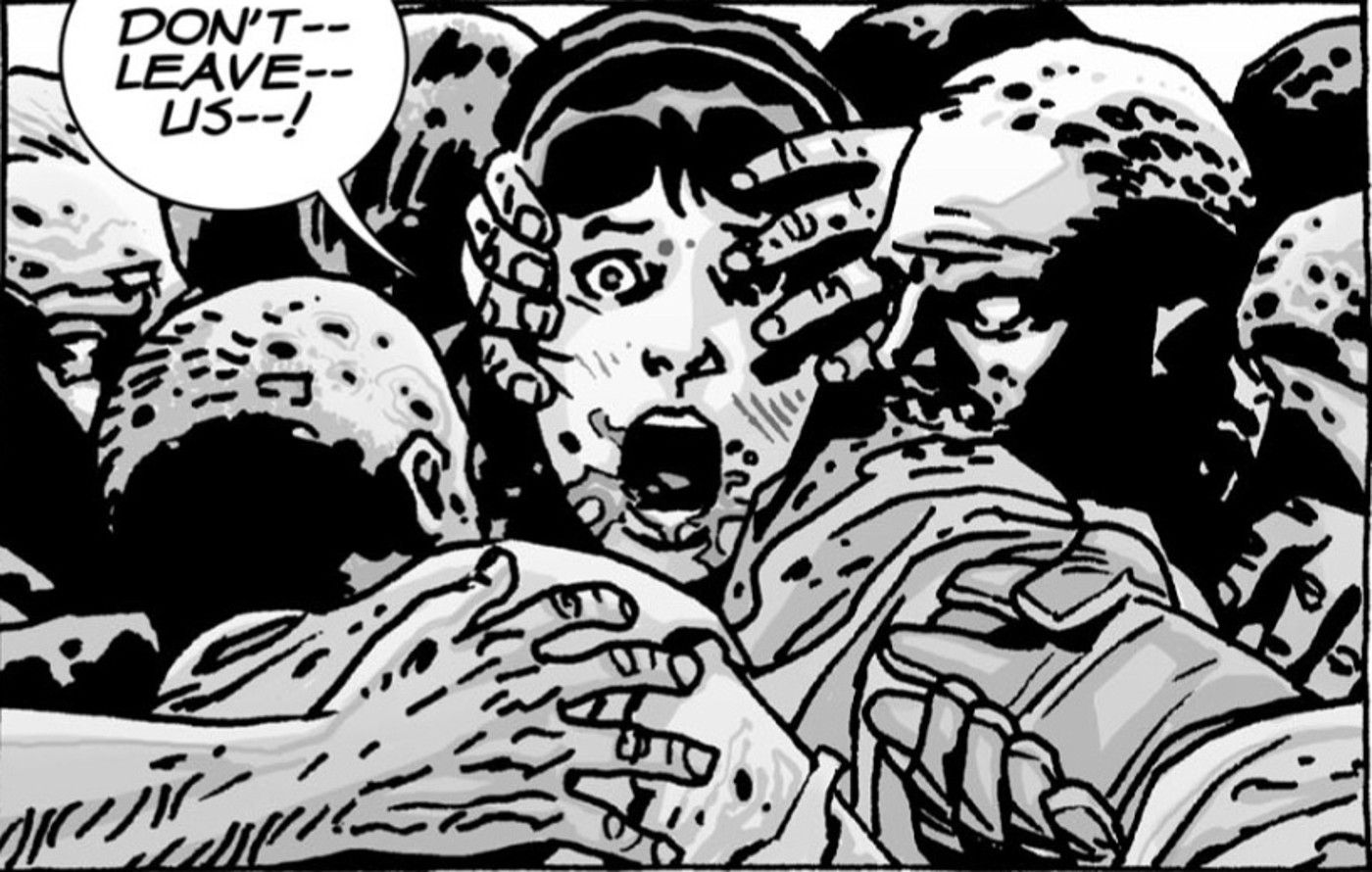
[As The Walking Dead progressed] characters turned their attention to building a new society out of the ruins of the old – something that, of course, was far from free of the comic’s characteristic high-stakes drama and breathtaking violence.
Though neither readers nor Robert Kirkman knew it at the time, The Walking Dead #96 is effectively the exact halfway point of the comic’s run, as the series would ultimately reach issue #193 before abruptly concluding. So, it is particularly interesting that the issue ends with a moment that serves as the hinge between what are effectively the first and second acts of the overall story. In other words, Rick’s final line closes “Book One” of The Walking Dead, which was about survival at all costs.
The subsequent issue, then, inaugurated “Book Two,” where the focus became about the characters carving out a life for themselves in the new world. Upon first reading The Walking Dead – especially for those who kept up with the comic during its original release – this might not strike readers as an overt shift, but it is an important moment to identify, because the change grows more pronounced as the series continues, and in the end, actually represented the “final form” of The Walking Dead.
Though the back half of The Walking Dead contained many similar challenges to earlier arcs, characters responded to the by-now familiar terror and tragedy of the post-outbreak world in increasingly different ways. While survival was always a factor, over time it became less of the sole “driving” factor of the plot, as Kirkman described it in The Walking Dead Deluxe #96. In its place, characters turned their attention to building a new society out of the ruins of the old – something that, of course, was far from free of the comic’s characteristic high-stakes drama and breathtaking violence.
“The Walking Dead” Was At Its Best When Robert Kirkman Struck A Balance Between “Show’ & “Tell”
The Prototypical Author’s Dilemma
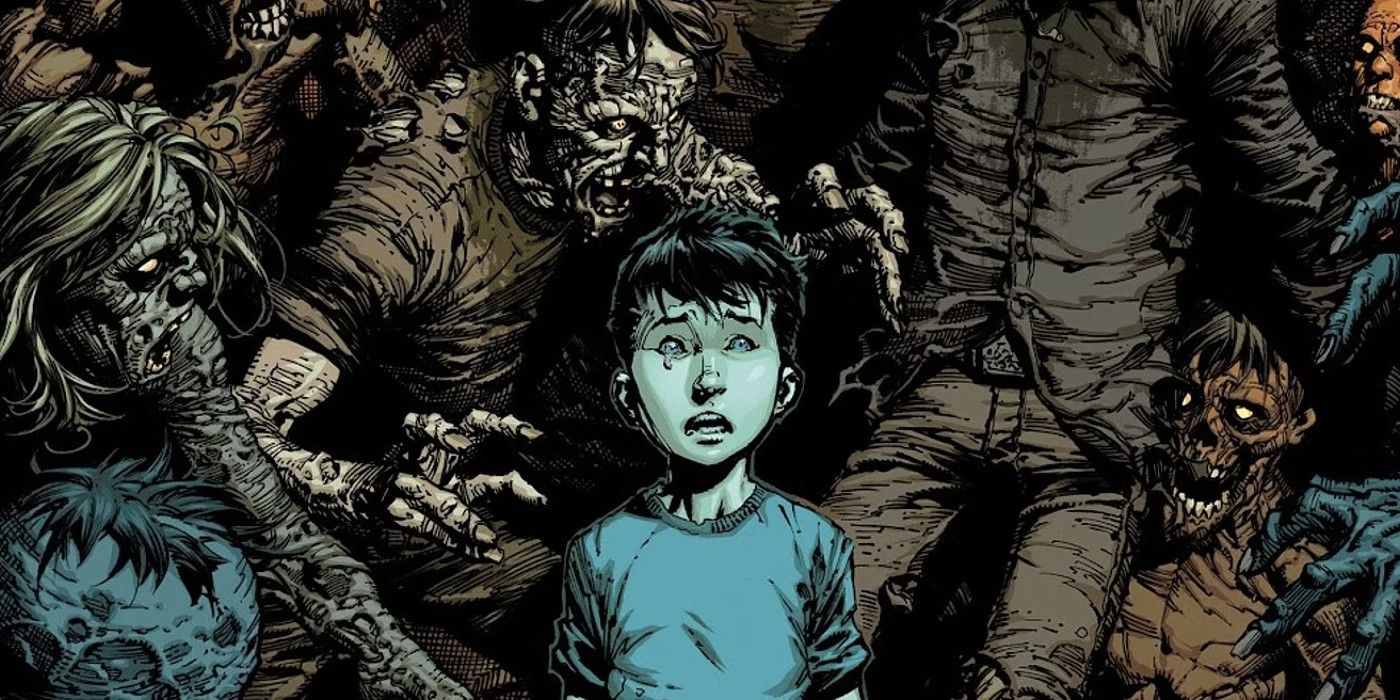
As an author, Kirkman rarely, if ever, hesitated to have his characters say exactly what they needed to in order to forward the plot.
Anyone who has taken a creative writing class is likely to be familiar with the adage, “show, don’t tell,” but of course, writing – whether fiction, or nonfiction – is more complex than just an “either/or.” Successful writing requires a balance between these two modes; of course, the comic book medium, like film and television, offers the advantage of being able to actually show the reader things, rather than having to conjure imagery in the reader’s mind with just words on a page.
Still, comic writing has its own “show vs. tell” divide – and Robert Kirkman’s writing is a particularly noteworthy example of how to overcome it, especially in The Walking Dead. This goes back to Kirkman’s skill at putting his thematic ideas directly on the page; in a way, the routine action and gore of the series afforded Kirkman the opportunity to balance things out with frequent monologue or dialogue-heavy scenes. As an author, Kirkman rarely, if ever, hesitated to have his characters say exactly what they needed to in order to forward the plot.
That is to say, Kirkman used exposition skillfully, and rarely wasted his own time, or the reader’s, trying to be subtle. Subtlety can be a great thing in fiction, but the brash, fast-paced nature of The Walking Dead made it better for the series to lay its cards on the table early and often. This included dialogue as much as action and plot. Though Robert Kirkman might tease himself for ending an issue with a “seven-page speech,” he certainly recognizes that the scene was as climactic as any action.
Rick’s “Start Living” Speech Lives In The Shadow Of Negan’s Introduction
Countdown To The Walking Dead Deluxe #100 – Available November 6
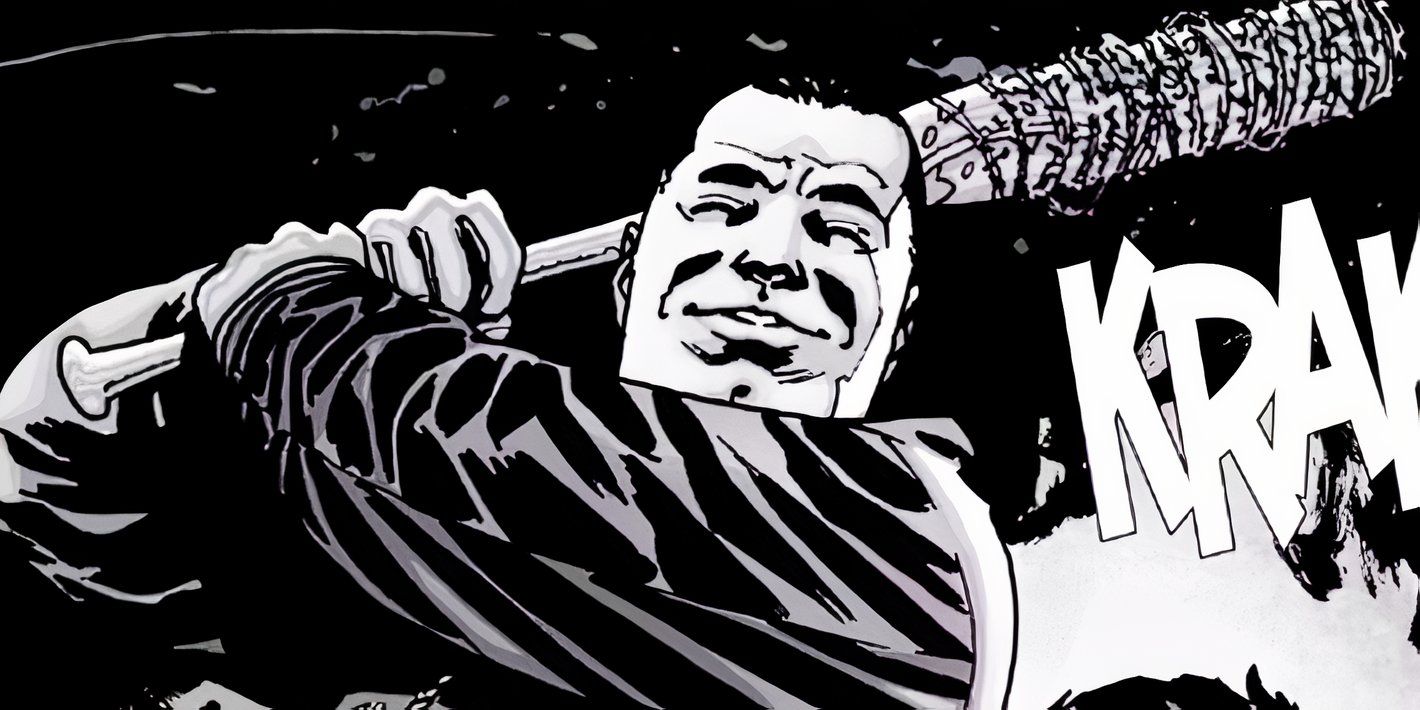
The Walking Dead #96 is a major milestone for the series in another way, in that it marks the first time Rick and his group learn about the group known as the “Saviors” and their leader, Negan. In that sense, Rick’s “…and start living” speech is also charged with tragic irony; just four issues later, in The Walking Dead #100, their group would suffer one of its most tragic losses, with the death of Glenn, and be forced into their greatest fight for survival yet.
Nevertheless, it was the beginning of the new trajectory for the series, which would carry The Walking Dead all the way to its final coda. For fans of the franchise who are not already following The Walking Dead Deluxe, now is the perfect time to start, as the re-release approaches Deluxe #100 and the official appearance of Negan, signaling the start of the comic’s most memorable stretch. With Robert Kirkman’s comments about the arc of the series in mind, it will be even more exciting to revisit Negan’s short and long-term impact on The Walking Dead.
The Walking Dead Deluxe #96 is available now from Image Comics.





